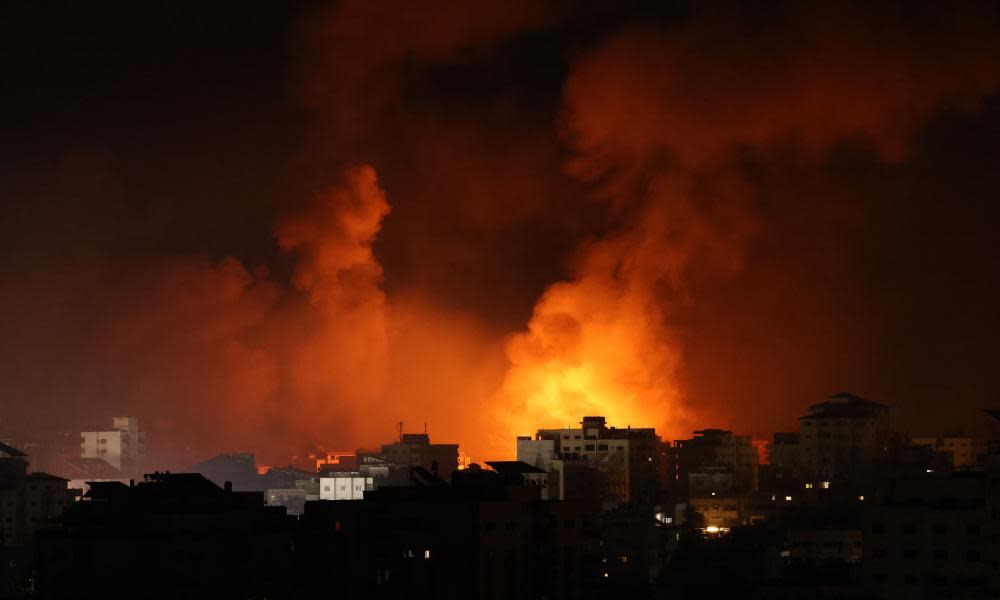No end to the circle of violence in Israel and Palestine

Jonathan Freedland aptly captures the Groundhog Day character of the recurrent deadly Middle East war/ceasefire cycles (Once this violence in Israel and Gaza ends, there can be no return to ‘normal’, 14 May). Israel, as the dominant and occupying force, has the capacity but not the motive to bring this to an end. Benjamin Netanyahu, who has no interest in the receding prospect of a two-state solution, is happy to accept the collateral damage to his own population as a price worth paying to maintain the status quo. If necessary, Trump-style encouragement of extreme-right thugs can usefully provoke the expected response. Hamas, committed to a pyrrhic form of defence, gains prestige, but no practical benefit for the Palestinians, while the weak and directionless Palestinian Authority has no leverage, and the international community has effectively washed its hands.
In the circumstances, the Palestinians may reasonably conclude that the only hope is to make the pain for Israel unbearable, whatever the cost to themselves. Over time, intercommunal violence will damage the social fabric, and rockets of increased range and accuracy will threaten far more of the Israeli population. Communal harmony is also at risk outside Israel, with an increase in antisemitic attacks in Europe and the UK. Many Jews support the Palestinian cause, but a significant intervention could be made if established communal organisations, particularly here and in the US, were prepared to call out racism in Israel and recognise the pragmatic as well as moral case for demanding equal rights for all who live in Israel/Palestine.
Dr Anthony Isaacs
London
• In his moving piece on the awful scenes in the Middle East, Jonathan Freedlandpoints to the huge difference in suffering between the two sides, rightly comparing the “Tel Aviv bubble” with the apartheid-like discrimination in the West Bank, and the siege-like conditions in the de facto prison that is Gaza illegally and cruelly blockaded.
Freedland understandably finds it difficult to see a way out of the cycle of violence and return to “normal”. How can it while the conflict is portrayed as there being wrong on both sides, and the more powerful protagonist is supported explicitly and implicitly? It’s essential to recognise the valid grievances of the Palestinians and give explicit direction to Israel to abide by the norms of international law (which include the right to proportionate self-defence).
Those who speak out for justice and peace must be given voices and supported. Here in the UK, we’ve seen increasing support for the Israeli government in recent years. It’s a shame that parochial factors have been used to marginalise or silence those who have long argued for a peaceful and just solution that recognises the legitimate rights of all in the region.
Ian Reissmann
Henley-on-Thames, Oxfordshire
• Jonathan Freedland says that, not for the first time, “Hamas has done Netanyahu a favour”. The truth of the matter surely is that Benjamin Netanyahu has done himself a favour with his latest provocation of an oppressed people whereby Jews can reclaim property owned before 1948 but Palestinians cannot, with disastrous consequences for many Palestinians. Netanyahu knows that the international community will do nothing, just as it has done nothing to address a string of injustices perpetrated by the Israeli state against Palestinians.
Can Netanyahu be surprised at the reaction from Hamas? No. Does it help him hold on to power and avoid scrutiny? Yes. Should Palestinians be held responsible for falling into the trap? No, for as with all oppression, it is the oppressors who need to acknowledge their wrongdoing before real progress can be made. The actions of Netanyahu are not the result of some collective amnesia resulting from life inside the Tel Aviv bubble, as Freedland seems to suggest towards the end of his piece, but are deliberate acts of oppression by a man who does not want progress. It takes an act of will to forget a 54-year occupation, just as it takes an act of will to forget the separate legal systems for Jews and Palestinians and the rest of the mounting, state-sponsored oppression that Netanyahu leads.
Colin Jones
West Norwood, London
• Jonathan Freedland gives a typically perceptive analysis of the Israel-Gaza situation. He acknowledges that the incendiary moves in Jerusalem and its holy sites have “provoked this latest crisis” and explains that Benjamin Netanyahu was on the verge of losing power to a coalition sustained by two Arab parties. But he fails to draw the stronger conclusion that Netanyahu deliberately provoked the events in Jerusalem. Netanyhau needed a crisis to protect his own position, and produced one.
Neville Pressley
Shoreham-by-Sea, West Sussex
• Now that press freedom and the lives of foreign journalists are threatened (Israeli strike destroys Gaza tower housing media organisations, 15 May), will the international community not speak out? AP has categorically stated that the bombing of the tower block will result in the world knowing less about events in Gaza. The bombing of the temporary media facility one day later is a further blatant attack on press freedom and is yet another illustration of the absolute disregard Israel has for humanity and international law, or seemingly its closest ally.
The US failed to condemn Israel when its own citizen Rachel Corrie, a peace activist, was mown down and killed by an Israeli bulldozer. It wasn’t enough for the UK to condemn Israel when an Israeli sniper cut short the photojournalist Tom Hurndall’s life. Innocent children are suffering and dying. Yet there is no condemnation. Will attacks on the foreign press also go unanswered? When will the ongoing atrocities committed by Israel be condemned? It’s time for the international community to speak out and stop the senseless killing.
Yasmin Ataullah
Surrey

 Yahoo Movies
Yahoo Movies 
